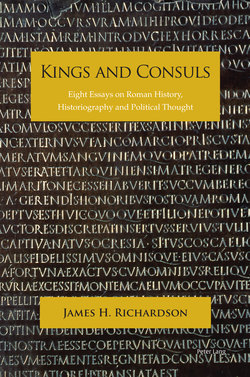Читать книгу Kings and Consuls - James Richardson - Страница 9
На сайте Литреса книга снята с продажи.
ОглавлениеAcknowledgements
The dedication of this book to him hardly suffices to express my gratitude to Peter Wiseman, not only for his teaching and supervision, but also for years of advice and encouragement. The book owes its existence to Peter in more ways than one; indeed, it was even he who first suggested, after kindly reading a draft of the essay that forms Chapter 2, that I should try to publish a collection of my papers on early Rome. It is an additional pleasure and privilege to be able to offer it to him in the year, if not quite on the occasion, of his eightieth birthday.
Thanks are also due to Philip Dunshea, the commissioning editor at Peter Lang, for his help with organising the project and for his supportive approach from the very start, Lucy Melville, for seeing the book through the various stages of production and the press’ anonymous referees for all their useful feedback. With such excellent advice from so many different sources, it goes without saying that all the problems and errors that remain are entirely my own. The research and writing of Chapters 1, 2 and 6 were greatly helped by a Marsden grant and I am extremely grateful to the Royal Society of New Zealand for its financial support. Finally, special thanks are also due to my wife Catherine and my son Aiden, for their support and for everything else.
It was Joachim Fugmann’s incredibly useful and excellently produced commentary on the De viris illustribus that first prompted me to think of Peter Lang. It seemed altogether not without a certain appropriateness.
With one exception, all of the following essays have been published before: ‘The People and the State in Early Rome’, in Andrew Brown and John Griffiths, eds, The Citizen: Past and Present (Auckland: Massey University Press, 2017), 63–91; ‘The Oath per Iovem lapidem and the Community in Archaic Rome’, Rheinisches Museum für Philologie 153 (2010), 25–42 (Bad Orb: J. D. Sauerländers Verlag); ‘Rome’s Treaties with Carthage: Jigsaw or Variant Traditions?’, in Carl Deroux, ed., Studies in Latin Literature and Roman History XIV, Collection Latomus 315 (Brussels: Éditions ←ix | x→Latomus, 2008), 84–94 (Leuven: Peeters); ‘Ancient Historical Thought and the Development of the Consulship’, Latomus 67 (2008), 328–41 (Leuven: Peeters); ‘The Roman Nobility, the Early Consular Fasti, and the Consular Tribunate’, in Jeremy Armstrong and James H. Richardson, eds, Politics and Power in Early Rome (509–264 bc), Antichthon 51 (Cambridge: Cambridge University Press, 2017), 77–100; ‘“Firsts” and the Historians of Rome’, Historia: Zeitschrift für alte Geschichte 63 (2014), 17–37 (Stuttgart: Franz Steiner Verlag); ‘L. Iunius Brutus the Patrician and the Political Allegiance of Q. Aelius Tubero’, Classical Philology 106 (2011), 155–61 (Chicago: University of Chicago Press).
I am grateful to the several publishers for their permission to reprint these works. I have made some modifications to each, to try to take into account more recent work, where it may be useful or may have affected the argument, to address various other matters and also to reduce some of the repetition of material between the different chapters. It should be noted, however, that a certain amount of repetition could not be avoided: although this is a book, designed to be read like most other books, from start to finish, I wanted to ensure that each individual essay nonetheless remained intelligible in and by itself. I have also added translations of the Greek and Latin.
←0 | 1→
